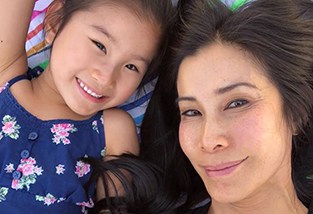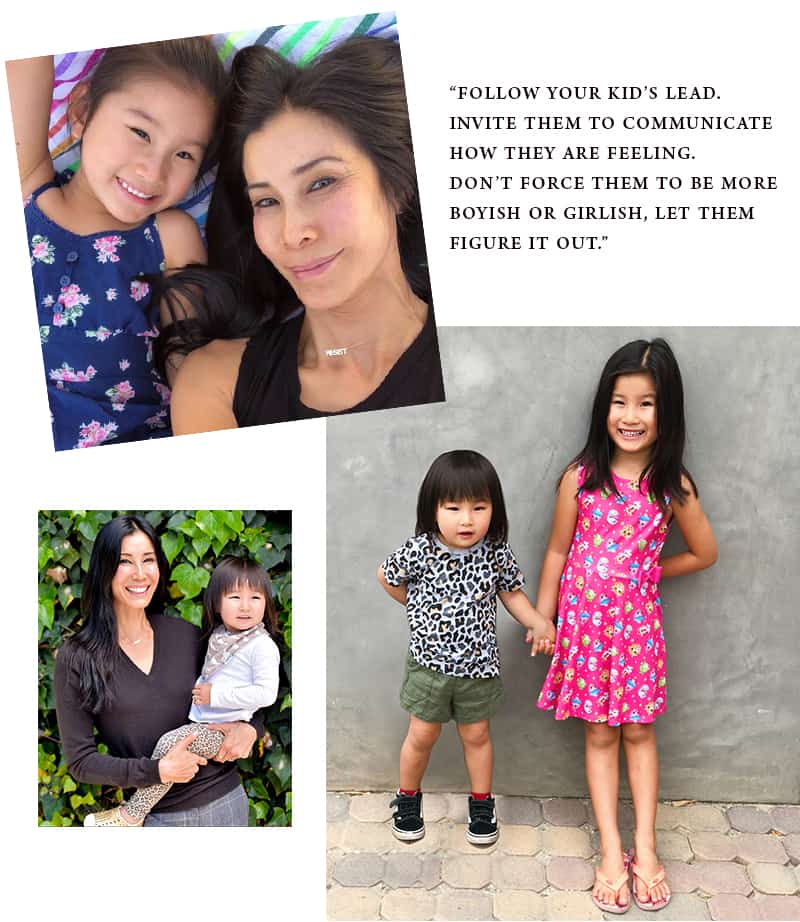
Q&A: Lisa Ling On Her New Special On The Gender Revolution
Written by Katie Hintz-Zambrano
For so many of us growing up with “Channel One News” in our classrooms, journalist Lisa Ling was a consistent presence in our lives. And—luckily for us—the journalist hasn’t stopped reporting on all the important stories in the world ever since. Now a mom of two daughters—Jett, 5, and Ray, 2—Lisa’s CNN docu-series “This Is Life With Lisa Ling” explores a plethora of hard-hitting topics. And this weekend’s episode is a must-watch for parents, grandparents, kids, really everyone. Debuting on Sunday, October 7th, at 10pm ET/PM (set your alarms!) on CNN, the latest “This Is Life” episode is all about what Ling is calling “the gender revolution.” Exploring topics of identity and gender fluidity—in both children and adults—the episode is enlightening and eye-opening. On the eve of the important program’s debut, we spoke with Ling about her thoughts on raising two daughters, gender, and her advice to parents.
You are raising two girls. Was gender something you thought about before you had them?
“I never really had that biological desire to have a child, period, until my husband and I had been married a number of years. And honestly, I am so glad that I have these two children, because they are the light of my life. There is nowhere I would rather be and nothing I would rather do than be with these kids. We were pretty content with just having one child, but when we decided to try and have a second child, I did want a boy because I wanted one of each. And my husband had always wanted to have a boy. It’s something he has prayed to god for all of his life. So, when we found out we were having another girl, his disappointment was really palpable and really sad for me. I wanted him to feel really excited about having this child, irrespective of the gender. But what I’ve learned throughout this process is, at the end of the day, how your child is going to turn out is a big question mark. I’ve always been someone who has been sensitive to genders norms and when we found out we were having a girl, we didn’t have a shred of pink in our house. We painted our daughter’s room yellow and gray and kept everything very gender neutral. I didn’t want my children to feel like they had to subscribe to these gender norms. But as soon as she could, as soon as she saw the color pink, my oldest daughter was just drawn to it in a way that was out of my control, completely. This happened when she was around 18 months old. Not only did she insist on wearing pink, but there had to be some sparkle in what she wore, as well. I just realized that no matter what you want for your child and whatever you expect, in all likelihood it’s going to be turned on its head. You shouldn’t go into parenting with these kinds of expectations. You can certainly have hopes, but you shouldn’t have too many expectations. Magic Johnson, whom I interviewed in our gender fluidity episode, is the perfect example of someone who had expectations for his son. They put him in every sport—T-ball, basketball, baseball—while all EJ wanted to do was play with dolls. When he saw EJ’s desire to play with girls and all things ‘girlier,’ Magic realized then, ‘Ok, I have to work on myself. I need to adjust the way I’m thinking and I cannot continue to try and have my expectations fulfilled by this child, who just wants to do his own thing.'”
When it comes to gender fluidity, a lot of people are intimidated by using new pronouns. It’s not just “he” and “she” anymore. What’s your take on that?
“I always tell people, I am going to screw up the pronouns, because up until recently, I’ve spent my entire 45 years of life only using boy and girl or only having to decide between boy and girl. What is exciting about this gender revolution is kids these days increasingly have the tools and they have other people whom they can share their feelings and experiences with. They have been able to find communities of people who have been feeling the way they’ve felt, online. I think that has given young people a lot more confidence in being able to express where they fall on the gender spectrum and even experimenting with gender. To many of us, the notion of experimenting with gender seems so foreign. In an effort to try and figure out how one can become most comfortable in one’s own skin, sometimes that may include having painted nails or wearing a dress if you’re a boy or having a really short hairstyle if you are a girl. I actually admire these kids for having the vocabulary and having the courage to be able to say, ‘I’m trying to figure this out and I’m trying to get to a place where I feel comfortable.’ I think, as a result, hopefully we’ll see the rates of suicide drop, because kids are more able to express or communicate what makes them feel most comfortable.”
What advice would you give to parents trying to navigate the new gender revolution?
“Follow your kid’s lead. Invite them to communicate how they are feeling. Don’t force them to more boyish or girlish, let them figure it out. It’s probably going to feel uncomfortable and strange, but just know they’re doing what they feel they need to do to feel comfortable in their own skin. Allow your child to lead without you intervening, but let them know that they can talk to you about it and this is a process they can go through with you. What would be great is if parents can say to their kids, ‘just hold my hand through this, because it’s all new to me, too, but let’s do this together. Let’s figure out how you can be happiest and most comfortable, together.'”
In the special, you also showcase the plethora of different labels people are putting on themselves, which go well beyond “transgender,” “bisexual,” etc.
“It’s really fluid. On the one hand, there are all of these ways to describe yourself, but it’s very fluid and that can change, in terms of how one identifies themselves. And that’s ok because you’re just trying to figure it out. It’s also important to note that these gender issues don’t have anything to do with sexual orientation. Often I think people will confuse the two, but they are very different. How one identifies and who they feel sexually attracted to are two fundamental aspects of who we are, but they are two separate conversations.”
What would you love for people to take away from the episode?
“What I always ask of people when watching our show is if they can just set their judgement on the couch for a little while. Allow yourself to have an open mind. It’s hard to do these days because I think we are predisposed to hearing from people who share our same opinion. But our show is different and we are going to challenge people to think a little differently. In this episode in particular, I was just struck by how loving the parents and the spouse of the people we feature are. We feature a 42-year-old man, who has always felt like he had this feminine side of himself that he had to repress. He has been married for a number of years and he started to be able to verbalize some of the feelings he’s been having in recent years because of this gender revolution. He had to divulge that to his wife, who was still madly in love with the man she married, and you can imagine how that must have felt. But she has embraced this person, irrespective of his gender, and it is really moving. It is the purest example of loving a human being.”
After going through the process of creating this episode, have your own feelings about or behavior around gender changed?
“I really try to watch my language more. Last night I asked this woman who is pregnant, ‘What are you having? A boy or a girl?’ But then I stopped to think about it, and in a way it doesn’t really matter. She is hopefully going to have a healthy child. I don’t think it’s a bad thing to be more sensitive to gender issues. It’s hard to get used to using ‘they’ and ‘them’ as pronouns for one person, but once you get used it, like with these kids, it just rolls off the tongue like second nature. There are certainly things about women and things about men that just are the way they are, but I think as young people are concerned, or people who don’t identify exclusively with one gender, as a culture we need to give people permission to live the lives that they are happiest living.”
Tune in to the latest episode of This is Life With Lisa Ling, this Sunday, October 7th, 10pm ET/PT, on CNN.
Share this story




